When you’re first starting out the alliance thing is a bit confusing. I don’t actually remember it being explained to me, as that info is just assumed. And I realize I’ve done the same thing in my own articles. So here’s a little guide to Alliances, what your miles get you, and what things you need to consider.
If you’re not looking for 101 material, skip down to the fuel surcharge information as that could still be useful for anyone.
Most major airlines are part of an “alliance”, which is a network of airlines that work together. They sell each other flights, give codeshares and connect international passengers so the airline effectively has a global reach.
You don’t have to book an American Airlines ticket to Hong Kong and book a separate ticket from Hong Kong to Bali. They do all that for you as they share with each other to connect destinations.
The Three Big Alliances
Each one of these alliances has a global reach with major airlines (almost) everywhere you need to go.
What this means for someone with miles
If you have miles with one member in the alliance, you can fly on any of the other members. So if you have United miles, you can redeem those miles to fly on Lufthansa to Germany. Or you could use those miles to fly to Bangkok on Thai Airways, or anywhere else Thai Airways has flights!
So when you get American Airline miles, you aren’t limited to American Airlines’ network, but instead also everyone in the OneWorld alliance.
What this doesn’t mean for someone with miles
One common misconception is that you can combine miles of members of an alliance. Understand that if you are redeeming United miles, Air Canada miles are not going to help. If you’re short 10,000 United miles, you can not transfer or combine or use Air Canada’s Aeroplan miles to help.
Each program has a unique set of rules.
One question I get a lot is, “I read your post on how to use United miles to book stopovers; I have US Airways miles (or Air Canada, or something else in the alliance), can I book on United and get the same stopover rules?”
It doesn’t matter on whom you fly, United’s rules are for using United’s miles and US Airways routing rules are for using US Airways miles. Make sense?
If I redeem United miles on Air Canada, I still get 1 stopover and 2 open-jaws. If I redeem United miles on US Airways, I still get 1 stopover and 2 open-jaws. If I redeem United miles on Thai Airways, I still get 1 stopover and 2 open-jaws.
Even though, each airline has different rules for their own program, when I’m using United miles, the rules are always the same. (You can investigate the United miles rules here).
Non-Alliance Codeshares
Sometimes your miles even go beyond the alliance because the airline you hold miles with has made an agreement with an extra airline.
For example, British Airways and the Irish airline Aer Lingus have a codeshare partnership. This means that you can use your British Airways Avios on Aer Lingus flights even though they are not a part of the OneWorld alliance.
This is awesome because a oneway from Boston to Dublin on Aer Lingus is only 12,500 Avios! However, don’t go thinking that you can use your American Airlines miles on Aer Lingus because they are a partner with British Airways who is a partner of American Airlines. It doesn’t work like that. But you can redeem your miles on alliance partners or codeshare partners.
Airlines with no Alliance
Many small airlines or discount airliners have no alliance. For example, if you have Southwest points, you have no partner airlines with which to fly internationally. Southwest is a domestic niche discount airliner. Understand that their points get you just that and nothing else.
USING MILES
Zone Based, Distance Based, and Cash Based Award Pricing
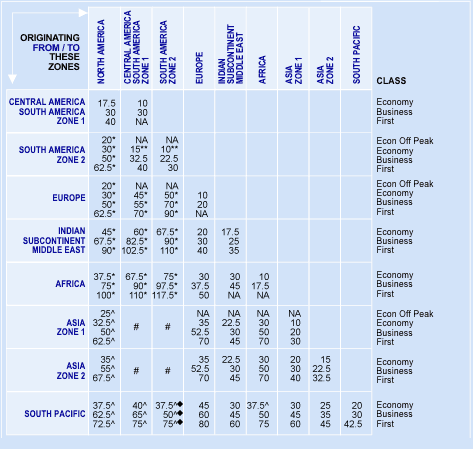
I did a short post on Zone Vs Distance Based Redemptions that you can read if you’re unfamiliar with the subject. I won’t repeat too much.
Here’s the skinny.
Zone based pricing means that from one “zone” or “region” as defined by the airline award chart, to another is one price. No matter where you are going in those regions, it is just one price.
An example is AA’s award chart on the right. From the US to Europe is 30,000 miles (in peak economy). It doesn’t matter if you take a short flight of New York to Dublin or a really long flight like LA to Istanbul, the price is 30,000 miles.
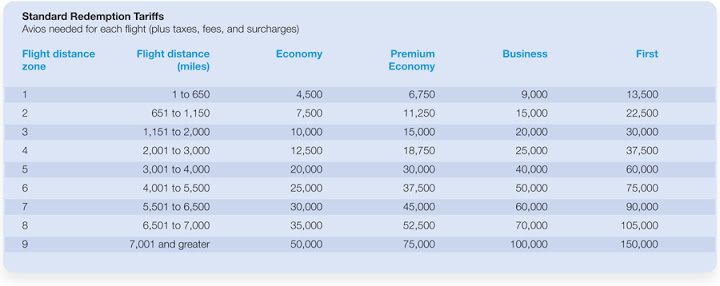
Distance based pricing is just what it sounds like. The more you fly the more it costs. As you can see above with British Airways’ award chart, if you fly 650 miles you pay 4,500 Avios (what they call their frequent flyer miles). Yet, if you fly 4,000 miles, you pay 20,000 Avios. It doesn’t matter what region it is, it just matters how far it is.
Cash based award pricing is a little more right now, but I have a feeling it will trend. Southwest is an example of this. When you see a flight for $100 it will cost 6,000 Southwest Points. When you see a flight for $200 it will cost 12,000 Southwest Points. It doesn’t matter where you fly, it just takes the price of the current revenue ticket and multiplies it, in this case, by 60.
What are the benefits and pitfalls of each?
Of course, it depends on each program. Some distance based award charts have astronomical prices and some have very reasonable prices. But here are my generalizations and top picks.
Zone Based
- Pros: Good for long haul flights. Again LA to Istanbul is only 30,000 AA miles but it’s a long flight. Nearly double the price of a domestic flight and way further.
- Cons: In general, it doesn’t matter if you only fly 77 miles from central Virginia to DC, or Miami to Seattle, the price is the same. Sometimes there is a short distance discount, but small at best. Paying 12,500 miles for a tiny flight is a rip off in my opinion.
- Recommendations: United, American Airlines, US Airways
Look at their award charts and see what suits your needs. But in general, I feel those three have the best prices for international flights.
Distance Based
- Pros: Short flights are now reasonable to pay with award points. Also, if you need to break up your trip into multiple short flights distance based programs are perfect for that.
- Cons: Long haul flights can be really, really expensive.
- Recommendations: British Airways (and ANA for multiple stopovers)
It is necessary to look at the alliance route maps to see if these programs can offer you short direct flights. At least with British Airways you pay per segment, so direct flights are crucial.
And a quick warning about these airlines, they pass on fuel surcharges. So if you plan to use them, read up on which airlines have fuel surcharges to pass on. This post can help you consider how to make the most of British Airways Avios.
Cash Based
- Pros: When there is a sale tickets are cheap
- Cons: When cash tickets are expensive, award tickets are expensive.
- Recommendations: Again, Southwest does this well. You can get killer cheap tickets on Southwest anyways, so your points can last a long time if you are a deal chaser.
Fuel surcharges – the biggest scam in all the airline world.
I’m not going to rant about how fuel surcharges are a scam, I’m just going to warn you about them.
Who has them built into their revenue tickets? You need to know this because airlines pass them on.
Who passes on the fuel surcharges? Better yet, this is what you need to know, so you can either avoid collecting miles with them or know who to use the miles on.
Understand that if you have Air Canada miles and redeem them on Lufthansa, you will get charged hundreds of dollars for fuel. Why? Because Lufthansa has fuel surcharges and Air Canada passes them on when using their miles. So beware.
Star Alliance:
- Who has them: Air Canada, Air China, ANA, Asiana Airlines, Austrian Airlines, Brussels Airlines, EgyptAir, Ethiopian Airlines, LOT Polish Airlines, Lufthansa, Scandinavian Airlines, Singapore Airlines, South African Airways, Swiss, TAP, Thai Airways, Turkish Airlines, United Airlines (on international flights, except within North and South America and the Caribbean).
- Who doesn’t have them: Air New Zealand, Avianca, TACA, TAM, US Airways and United (within the Americas).
- Who passes them on: Air Canada and Lufthansa
- Who doesn’t pass them on: United and Avianca TACA and US Airways
OneWorld:
- Who has them: American Airlines (on international flights, except within North and South America and the Caribbean), British Airways, Cathay Pacific, Finnair, Japan Airlines, Malaysia Airlines, Qantas, Royal Jordanian
- Who doesn’t have them: Air Berlin, American Airlines (within the Americas), Iberia, LAN
- Who passes them on: Air Berlin, British Airways
- Who doesn’t pass them on: American Airlines, LAN (right?)
Note that American Airlines does pass on British Airways fuel surcharges only.
SkyTeam:
- Who has them: Aeroflot, Air Europa, Air France, Alitalia, China Airlines, China, Eastern Airlines, China Southern Airlines, Czech Airlines, Delta, Kenya Airways, KLM, Korean Air, Vietnam Airlines
- Who doesn’t have them: AeroMexico, Saudia
- Who passes them on: Alitalia, Delta, KLM, Korean Air
- Who doesn’t pass them on: ?
If any of the fuel surcharge info is incomplete or off, please comment and I’ll update! Thanks.
I hope this all make sense as it’s an important part of saving money.
It’s highly recommended to collect miles with United Airlines or American, if only because they don’t pass on fuel surcharges. If you collect with Air Canada or British Airways, pay attention to who doesn’t have fuel surcharges and try to redeem on those airlines.
Stopover Rules
If you know me, I have to mention stopovers.
A stopover means that when you redeem your miles you can essentially have a second destination. A stopover, unlike a layover, can be for as long as you want.
An open-jaw is when you return to a different airport. For example, you fly into Paris and fly home from London. It’s the gap in your ticket where the airline is not responsible for transportation. It could be added to a stopover, or it could mean returning to a place other than your home/starting point.
Who has what stopover rules:
- United allows a stopover and two open-jaws on roundtrips.
Read more about United stopovers.
- US Airways allows a stopover or an open-jaw. They only allow roundtrips.
Read more about US Airways stopover rules. - American Airlines allows a stopover at the North American gateway city. They do allow them on oneway tickets.
Read more about American Airlines stopovers - Air Canada allows two stopovers, or one stopover and an open-jaw on roundtrip tickets.
- Delta allows a stopover and open-jaw on roundtrips
Obviously, I’ve written plenty about United stopovers and I highly recommend learning United’s routing rules or United’s most powerful zones – secrets of their award pricing. Although these are for experienced frequent flyers.
Credit cards earn what?
First, an airline branded credit card earns miles with that airline’s mileage program. Plain and simple. But there are programs that transfer to an array of airlines and maybe it’s confusing to lay it out by credit card company; instead it may be better to lay it out by airline.
United Airlines
United has a credit card with Chase.
Transfers:
- Chase Ultimate Rewards transfer to United 1:1 (need Chase Sapphire Preferred or Ink Bold)
- SPG transfers 2:1 to United. It’s a terrible value of SPG points but I’ll mention it as a possibility.
American Airlines
American has a branded credit card with Citi. In fact they have a Visa, Amex, and MasterCard version of the personal card. And they have a Visa and MasterCard version of the Business card. It’s been fun.
Transfers:
- SPG transfers to AA 1:1
US Airways
US Air has a branded credit card with Barclays. Might as well get it before the AA merger!
Transfers:
- SPG transfers to US Air at a 1:1 ratio
- You can transfer from Amex MR to US Airways in a roundabout way via AirCanada and points.com at a 1:0.85 ratio, plus a fee – learn more here. Worth it?
British Airways
British Airways has a Chase card. Once a year it’s given a 100,000 Avios bonus but with a $20,000 spend for the last 50,000 Avios. However, right now it’s waiving the first year’s annual fee, which is new.
Transfers:
- Chase Ultimate Rewards transfer to British Airways Avios 1:1 (need Chase Sapphire Preferred or Ink Bold)
- American Express Membership Rewards can transfer to British Airways Avios 1:1
- SPG transfers to British Airways Avios 1:1
Air Canada
Air Canada does have an American Express card
- American Express Membership Rewards can transfer to Air Canada Aeroplan Miles 1:1
- SPG transfer to Air Canada 1:1
Conclusion
To me, it’s first priority to choose an airline that isn’t going to trap me with fuel surcharges, like United and American. Second, I want good award pricing and great routing rules.
For this reason I do all my spending on Chase and transfer to United. Second, I go after AA miles. When I can’t do either, like with Amex points, I transfer to BA Avios and fill in domestic or short flights.
I hope you found this A to Z kind of post helpful. If it leaves questions, just comment below. And if you have knowledge on fuel surcharges, please share!


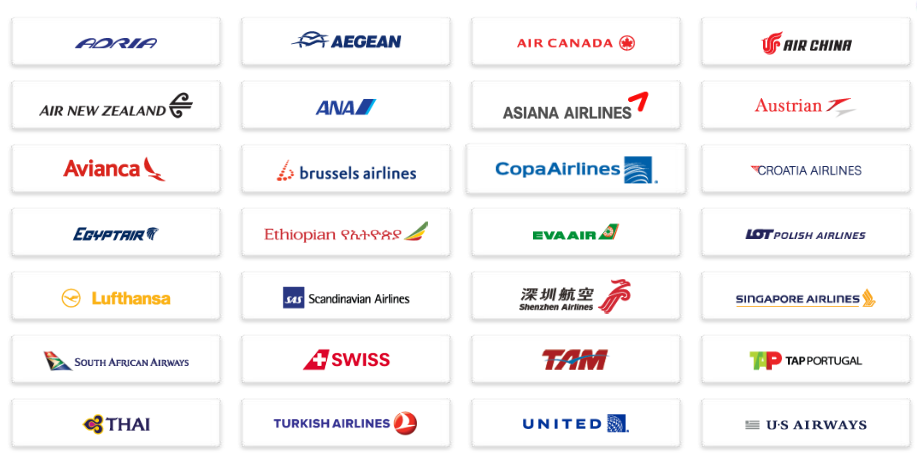
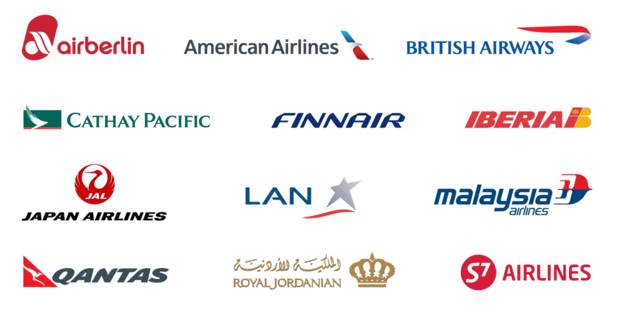
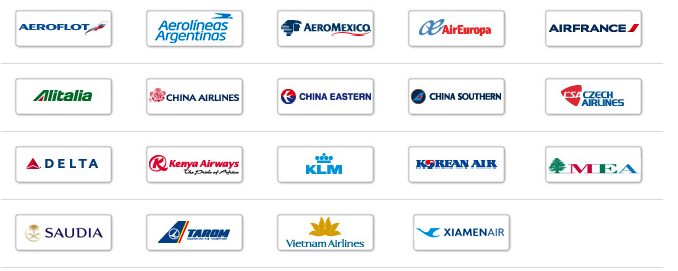
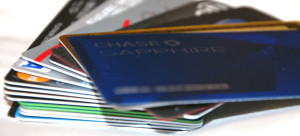

![Nick of FM on #40kFarAway [TIF Podcast]](https://travelisfree.com/wp-content/uploads/2019/10/travel-is-free-podcast-nick-40K-120x86.jpg)


US Airways has lots of other fees for booking awards, but I don’t believe that they pass on fuel surcharges.
Your right! Thanks Edward.
This is super educational, you are on a roll!
Thanks George. 😉
You listed US in both categories:
“Who passes them on: Air Canada, Lufthansa, and *US Airways*”
“Who doesn’t pass them on: United and Avianca TACA and *US Airways*”
Gotcha, got it changed.
Really good. Should be a sticky on FT.
That’s funny, cuz I was thinking before I posted that I should create a thread on flyertalk to maintain keeping track per airline, not just alliance.
On “fuel surcharge” listings, are you mixing paid and award travel here? On paid travel, they are obnoxious, but are part of the sticker price and to the traveler represent more of an accounting gimmick than a real extra fee. On award travel they are truly reprehensible because they make it impossible actually to claim a true award ticket – after they are imposed, all you get is a somewhat discounted fare, not a real award.
I think there needs to be a clear “Hall of Shame” for airlines that impose “fuel surcharges” specifically on their award tickets, as opposed to having one that is imbedded into a sticker price on paid travel, but is not charged to people redeeming awards. Does this make sense or am I confused about the post?
Award tickets. Exactly, it’s a discount for having miles. So dumb.
I really think it should be illegal. Sounds insane, but it’s fraud. They don’t pass on the “fuel surcharge”, they keep that money.
I mean, here’s what I’m doing. I’m saying hey, these airlines don’t have fuel surcharges built into their revenue ticket. That means that when you go to book your miles, even with mileage programs that do pass on YQ, like LH, you can book on the airlines that don’t have YQ to pass on. Make sense?
So yes, I’m listing rev yq according to ITA. But it’s for the goal of avoiding YQ in redemptions.
It’s not perfect though. I mean, ANA doesn’t charge YQ on United. I don’t think AC does on UA, SAS, Swiss, Turk or Egypt. All of which have YQ in their rev ticket but aren’t charged when redeeming Aeroplan. So in someways I need a master chart for each airline… but I figured alliance rev yq is a good place to start.
Are you intentionally leaving Delta out on the Credit Card Earns What section? I’m not a big fan of Delta, but for completeness sake I’d like to see them included as well
Another question: “Delta allows a stopover and open-jaw on roundtrips”. Only one open-jaw?
I honestly just don’t know Delta well. Avoid it a bit but you can earn from Amex points, that’s true. I don’t like recommending it, and there are many others I didn’t list as far as Amex transfers go. But they also have an amex card.
I think that’s right. No? 1 stopover and one openjaw?
Something’s missing…Alaska Airlines
So, in order to fly to Europe from the U.S. using American Airlines miles and avoid the fuel surcharge, I need to fly on AA metal. Is that correct? That is my only options for Europe using AA miles? What about Iberia? Do they pass on AA’s surcharge? I just want to make sure I understand.
Also, you mention several airlines in the OneWorld alliance as having the surcharge, but you don’t mention whether or not they pass it on (Cathay Pacific, Finnair, Japan Airlines, Malaysia Airlines, Qantas, Royal Jordanian). Unless, of course, I’m missing something.
Thank you for this great information, and my apologies if the answers to my questions are obvious; I’m simply trying to understand.
No worries.
You’re right that many airlines have fuel surcharges. BUT American Airlines, thankfully, does not pass them on. So the only airline you need to avoid is British Airways when redeeming AA miles. That’s what makes AA so great really.
Obviously I was missing something!
Thank you, I get it now.
Hello – great blog with very useful (advanced) info! So going through your list of *Alliance airlines with YQ I can conclude that SQ charges YQ and AC and LH are the only airlines whose programs pass on these charges. This implies that another program (eg. ANA) will not charge YQ on SQ flights. I don’t believe that’s true.
Another way of looking at the same question is, shouldn’t the list of airlines that pass on fuel surcharges + the list of airlines that don’t pass on fuel surcharges be the list of all member airlines?
The personal information should not be kept in a public
computer or in e-mails. The hackers of the world are very clever and work to make
sure that they have access to the entire bulk of information on the internet and ways to use that information to their benefit.
Bandwidth limits in a lot of places are so high tjat only a very small
number of users actually hit them. However in case you find your affiliate links too much time, simply shorten them via url shorteners that you can also find via search engines.
By entering a Username and Password they can access their own acount and by using yet another password caan
transfer money in or out of that account.
I’m kinda new to all this and have found you’re blog very VERY helpful. Especially your resources on hotel programmes.
How can I take advantage of airlines not including taxes or not passing them on as I am based in the UK, and in London. I understand BA are the worst but how can I get around it? Tranfer points to iberia using avios.com and use iberia? or are there better avenues?
Thanks in advance.
I use JetBlue quite often as their flights are convenient for where I live and their prices are very competitive. Is there a reason why you made no mention of JetBlue?
Why are you leaving out Virgin Atlantic. If I book using my Delta miles, there is no fee charged on a transatlantic Business (UPPER) class flight. If I book using my Virgin Atlantic miles, the fee is $442 US dollars. Note also that United miles can be exchanged for Virgin Atlantic miles using the Chase Sapphire card.